中国人和美国人语言交际中的面子观探索(附英文版)
中国人的面子观

Face Considerations in China and the US and its Influence for cross-cultural business negotiationAbstractWith the rapid development of economy and China’s entry into the WTO, the trade between China and America and its economic cooperation has increased significantly. Sino-US business negotiation, as an indispensable activities for promoting economic exchanges to realize cooperation and mutual benefits, are becoming more and more important.China and the US both have its unique and culture. Face considerations are an important aspect of culture. The differences between China and America in their perspective of face, degrees of concern with face and ways of dealing with face issues often bring difficulties in understanding or even misunderstanding in Sino-US business negotiation, becoming obstacles to negation. How to conduct cross-culture business negotiation better is a question that needs to be resolved for negotiators of China and the US. The thesis makes a relatively detailed study of the influence of the different face consideration in China and the US on business negotiators and give suggestions for Chinese and America negotiators in the last. Key words: face consideration; business negotiation; China andAmerica;culture differences摘要随着中国经济的快速发展以及中国加入世界贸易组织,中美贸易往来与经济合作显著增长。
跨文化交际下的中西方“面子”观

跨文化交际下的中西方“面子”观作者:余乐来源:《课程教育研究·学法教法研究》2016年第19期【中图分类号】G04 【文献标识码】A 【文章编号】2095-3089(2016)19-0246-01对于第二语言教学者来说,了解中西方的文化差异、实现有效的跨文化交际是非常有必要的;而中西方对“面子”的不同解读造成的交际冲突,也是跨文化交际中一个十分有趣的现象。
在中国,请客吃饭时,主人为了“面子”,点菜的数量往往超过实际人数很多;饭桌上,中国人更是常常劝客人喝酒,且表示“你不喝就是不给我面子”。
留学生们往往不能理解中国人所说的“面子”。
在他们看来,明明吃不了,还要点那么多菜,这是浪费的行为,为何会和“面子”有关?喝不喝酒完全是取决于自己的意愿,为何不喝就是不给对方“面子”?如若在中西方文化中,不能意识到中西方对“面子”的不同理解,则很难实现成功的交际。
萨丕尔曾指出:种族和文化的分界线确有点和语言的分界线相应的趋势[1]。
法国学者K.Baldinge也曾明确表示:语义学的特征是把人的注意力从封闭的语言结构引向了开放的经验结构,从语言学引向了非语言学世界以及关于这个世界的经验的逻辑[2]。
要想真正理解东西方对“面子”的解读,就必须回归到东西方的文化中进行理解。
正如胡先缙(2004)先生所述,中国人所说的面子代表一种社会重视的声誉,包括“脸”和“面”[3]。
“脸”和“面”是相互关联的两个方面,同时在中国社会中扮演着非常重要的角色。
虽然“面子”一词首先是由胡先缙先生介绍到西方的,但是西方根据其文化,也对“面子”作了多方面的阐释,其中最具有代表性的就是Goffman的“自我与面子功夫”理论和Brown、Levinsion的“面子”理论[4]。
Goffman认为“脸面工作”(facework)指的是避免威胁他人面子和修复受损面子的策略。
Brown和Levinson把“面子”进一步分为消极面子和积极面子。
中西文化面子观的差异及影响
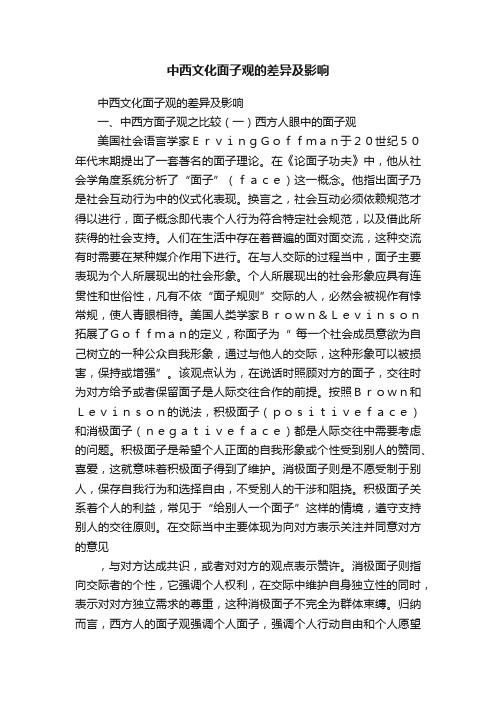
中西文化面子观的差异及影响中西文化面子观的差异及影响一、中西方面子观之比较(一)西方人眼中的面子观美国社会语言学家ErvingGoffman于20世纪50年代末期提出了一套著名的面子理论。
在《论面子功夫》中,他从社会学角度系统分析了“面子”(face)这一概念。
他指出面子乃是社会互动行为中的仪式化表现。
换言之,社会互动必须依赖规范才得以进行,面子概念即代表个人行为符合特定社会规范,以及借此所获得的社会支持。
人们在生活中存在着普遍的面对面交流,这种交流有时需要在某种媒介作用下进行。
在与人交际的过程当中,面子主要表现为个人所展现出的社会形象。
个人所展现出的社会形象应具有连贯性和世俗性,凡有不依“面子规则”交际的人,必然会被视作有悖常规,使人青眼相待。
美国人类学家Brown&Levinson拓展了Goffman的定义,称面子为“ 每一个社会成员意欲为自己树立的一种公众自我形象,通过与他人的交际,这种形象可以被损害,保持或增强”。
该观点认为,在说话时照顾对方的面子,交往时为对方给予或者保留面子是人际交往合作的前提。
按照Brown和Levinson的说法,积极面子(positiveface)和消极面子(negativeface)都是人际交往中需要考虑的问题。
积极面子是希望个人正面的自我形象或个性受到别人的赞同、喜爱,这就意味着积极面子得到了维护。
消极面子则是不愿受制于别人,保存自我行为和选择自由,不受别人的干涉和阻挠。
积极面子关系着个人的利益,常见于“给别人一个面子”这样的情境,遵守支持别人的交往原则。
在交际当中主要体现为向对方表示关注并同意对方的意见,与对方达成共识,或者对对方的观点表示赞许。
消极面子则指向交际者的个性,它强调个人权利,在交际中维护自身独立性的同时,表示对对方独立需求的尊重,这种消极面子不完全为群体束缚。
归纳而言,西方人的面子观强调个人面子,强调个人行动自由和个人愿望的满足,其实质是以个人为中心的社会价值观。
论面子观的中西差异

论面子观的中西差异摘要中西方由于历史发展和思想价值观的不同,因而有着不同的面子观。
在西方,Brown和Levinson 提出了以面子观为中心的礼貌理论,包括面子、威胁面子的行为以及面子保全论三个概念。
而在中国,面子是个体社会地位、社会价值关键词:面子理论;中西差异;文化差异AbstractChina and the western countries have different face theories due to their different historical development and cultural values.In western countries,represented by Brown and Levinson,they have put forward politeness principle centered on “face'’, including face,face—threatening acts and face—saving acts.While in China,face is related with traditional etiquette,which is the combination of ideal requirement and personal identity.This paper attempts to compare face concepts between western countries and China, which will be beneficial for cross.cultural communication.Key words: Face Theory; Differences between China and the West;Cultural Differences要面子是全世界各个民族普遍存在的社会现象,但是不同的民族对面子问题有着不同的理解。
中国人和西方人在交际价值观上的差异
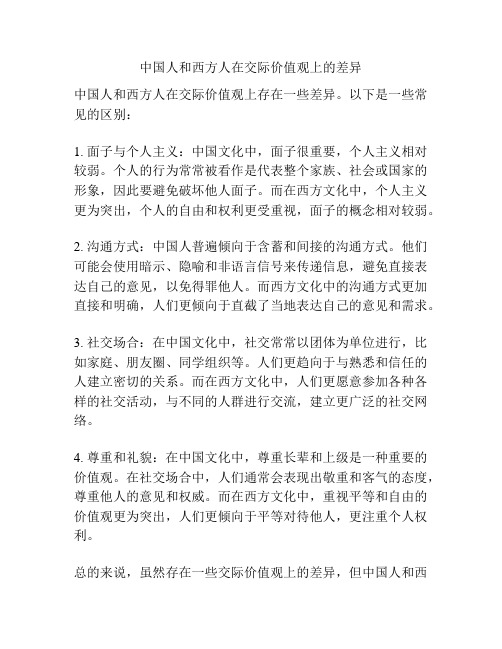
中国人和西方人在交际价值观上的差异
中国人和西方人在交际价值观上存在一些差异。
以下是一些常见的区别:
1. 面子与个人主义:中国文化中,面子很重要,个人主义相对较弱。
个人的行为常常被看作是代表整个家族、社会或国家的形象,因此要避免破坏他人面子。
而在西方文化中,个人主义更为突出,个人的自由和权利更受重视,面子的概念相对较弱。
2. 沟通方式:中国人普遍倾向于含蓄和间接的沟通方式。
他们可能会使用暗示、隐喻和非语言信号来传递信息,避免直接表达自己的意见,以免得罪他人。
而西方文化中的沟通方式更加直接和明确,人们更倾向于直截了当地表达自己的意见和需求。
3. 社交场合:在中国文化中,社交常常以团体为单位进行,比如家庭、朋友圈、同学组织等。
人们更趋向于与熟悉和信任的人建立密切的关系。
而在西方文化中,人们更愿意参加各种各样的社交活动,与不同的人群进行交流,建立更广泛的社交网络。
4. 尊重和礼貌:在中国文化中,尊重长辈和上级是一种重要的价值观。
在社交场合中,人们通常会表现出敬重和客气的态度,尊重他人的意见和权威。
而在西方文化中,重视平等和自由的价值观更为突出,人们更倾向于平等对待他人,更注重个人权利。
总的来说,虽然存在一些交际价值观上的差异,但中国人和西
方人在交际中都注重人与人之间的关系和尊重他人的权利。
这些差异可以在相互了解和尊重的基础上得到适当的调和和借鉴。
中西方面子研究综述
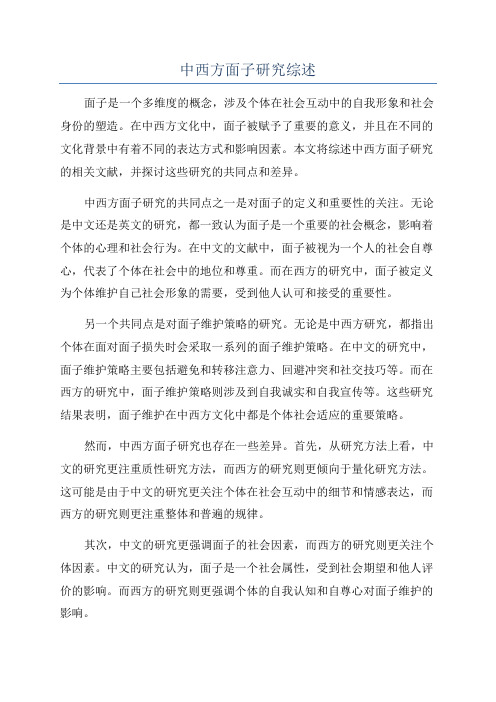
中西方面子研究综述面子是一个多维度的概念,涉及个体在社会互动中的自我形象和社会身份的塑造。
在中西方文化中,面子被赋予了重要的意义,并且在不同的文化背景中有着不同的表达方式和影响因素。
本文将综述中西方面子研究的相关文献,并探讨这些研究的共同点和差异。
中西方面子研究的共同点之一是对面子的定义和重要性的关注。
无论是中文还是英文的研究,都一致认为面子是一个重要的社会概念,影响着个体的心理和社会行为。
在中文的文献中,面子被视为一个人的社会自尊心,代表了个体在社会中的地位和尊重。
而在西方的研究中,面子被定义为个体维护自己社会形象的需要,受到他人认可和接受的重要性。
另一个共同点是对面子维护策略的研究。
无论是中西方研究,都指出个体在面对面子损失时会采取一系列的面子维护策略。
在中文的研究中,面子维护策略主要包括避免和转移注意力、回避冲突和社交技巧等。
而在西方的研究中,面子维护策略则涉及到自我诚实和自我宣传等。
这些研究结果表明,面子维护在中西方文化中都是个体社会适应的重要策略。
然而,中西方面子研究也存在一些差异。
首先,从研究方法上看,中文的研究更注重质性研究方法,而西方的研究则更倾向于量化研究方法。
这可能是由于中文的研究更关注个体在社会互动中的细节和情感表达,而西方的研究则更注重整体和普遍的规律。
其次,中文的研究更强调面子的社会因素,而西方的研究则更关注个体因素。
中文的研究认为,面子是一个社会属性,受到社会期望和他人评价的影响。
而西方的研究则更强调个体的自我认知和自尊心对面子维护的影响。
最后,中西方在面子研究中关注的方面也有一定差异。
中文的研究更关注面子的正面意义,即个体在社会中的威望和尊严。
而西方则更关注面子的负面意义,即个体在社会中的尴尬和不尊重。
总的来说,中西方面子研究都认为面子是一个重要的社会概念,对个体的心理和行为有着重要的影响。
无论是中文还是西方的研究,都在探讨面子的定义、重要性和面子维护策略等方面存在共同点和差异。
中西方价值观中“面子观”的差异分析——以电影《喜宴》为例
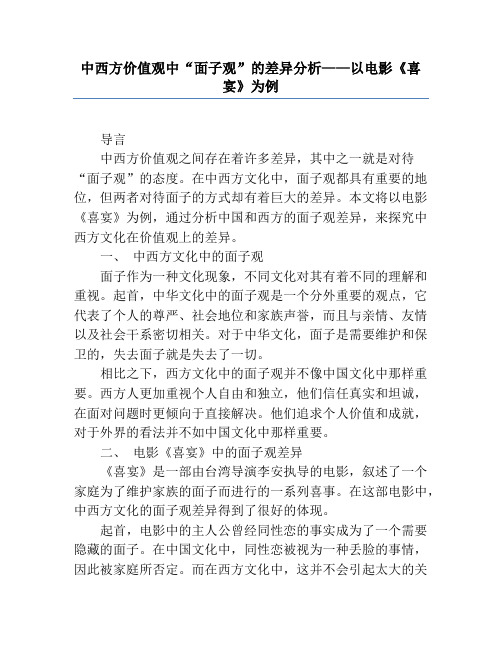
中西方价值观中“面子观”的差异分析——以电影《喜宴》为例导言中西方价值观之间存在着许多差异,其中之一就是对待“面子观”的态度。
在中西方文化中,面子观都具有重要的地位,但两者对待面子的方式却有着巨大的差异。
本文将以电影《喜宴》为例,通过分析中国和西方的面子观差异,来探究中西方文化在价值观上的差异。
一、中西方文化中的面子观面子作为一种文化现象,不同文化对其有着不同的理解和重视。
起首,中华文化中的面子观是一个分外重要的观点,它代表了个人的尊严、社会地位和家族声誉,而且与亲情、友情以及社会干系密切相关。
对于中华文化,面子是需要维护和保卫的,失去面子就是失去了一切。
相比之下,西方文化中的面子观并不像中国文化中那样重要。
西方人更加重视个人自由和独立,他们信任真实和坦诚,在面对问题时更倾向于直接解决。
他们追求个人价值和成就,对于外界的看法并不如中国文化中那样重要。
二、电影《喜宴》中的面子观差异《喜宴》是一部由台湾导演李安执导的电影,叙述了一个家庭为了维护家族的面子而进行的一系列喜事。
在这部电影中,中西方文化的面子观差异得到了很好的体现。
起首,电影中的主人公曾经同性恋的事实成为了一个需要隐藏的面子。
在中国文化中,同性恋被视为一种丢脸的事情,因此被家庭所否定。
而在西方文化中,这并不会引起太大的关注,因为个人选择和自由是西方文化的核心。
这一差异使得电影中的家庭面临着巨大的狐疑和冲突。
其次,在电影中,主人公选择婚姻的对象受到了家族的强烈的责备和抵制,因为她来自底层社会,与传统中国家庭的期望相去甚遥。
在西方文化中,个人幸福和选择是至高无上的,而在中国文化中,个人幸福往往需要顾及家庭的利益和面子。
这一差异使得电影中的主人公面临着是否坚持自己选择的逆境。
最后,在电影中,电影创设了许多笑点和尴尬的场景,尤其是在宴会上出现的错误和糗事。
这些场景体现了中国文化中的“面子面子”观念,中国人往往不允诺在大众面前出现尴尬和错误,因为这会直接损害到个人和家族的面子。
中美面子观的差异比较

"Face Problems" Consideration in Chinese and AmericanChina and the United States both have its unique culture. Face considerations are an important aspect of culture. The differences between china and the United State in their perspectives of face, degrees of concern with face and ways of dealing with face issues often bring about difficulties in communication.First I’d like to list some classical differences in daily life between Chinese and American 1.greet2.Farewell3、Provide4、ThanksSo ,why the people from these countries has such large different when that talking and living. I think it’s all because of the different way treat “face problem”.China and the United States both have its unique culture. Face considerations are an important aspect of culture. The differences between china and the United State in their perspectives of face, degrees of concern with face and ways of dealing with face issues often bring about difficulties in communication.Major Characteristics of Chinese Concept of “Face”Chinese concept of "face" has a lot of special characteristics according to traditional culture.In Chinese, “face” has to do with the image or credibility of the person you are dealing with. You should never, insult, embarrass, shame, yell at or otherwise demean a person. If you do, they will lose "face". For example, in ancient times, a Chinese warrior chief may commit suicide after losing a battle, because he has lost face. While this may no longer occur, the concept of "face" remains alive and in China. Awareness of face and it's impact has been an extremely important cultural issue.In addition, face has a significant business impact. For example, in the business world, negotiations should be conducted to assure that the person at the other end of the table maintains face even if the deal should not conclude successfully, and his "face" may be dependent upon his ability to conclude the deal.Major Characteristics of American Concept of “Face”In American culture I think people value individualism. Especially, young people are concerned with being “individuals” nowadays.Concerns for face exist in the United States but remain out of most people's awareness. Life in North America has been relatively mobile from the earliest days of European colonization and is highly mobile today, and the composition of one's community and friendship groups changes often during one's lifetime, and even relatives can be left behind when somebody decides to search for opportunity elsewhere. Rarely is the maintenance of group integrity and harmony paramount in a lasting way, so to make face-saving seems to be less critical.In the west, humanity is largely defined theologically. The concept of humanity is largely separable from society. Since humanity is endowed by God, loss of “lian” would thus hardly equal loss of personhood or humanity. Human dignity is regarded as profound, and an individual still has a stronghold of God-endowed humanity that provides alternatives by which to sustain meaningful living in the culture after the loss of face. This may explain why western politicians still appeared dignified, self-confident, and friendly to opponents who have defeated them in political campaigns. In the west, loss of face is similar to loss of mianzi in China. But the former may produce fewer undesirable consequences than the later. Loss of face in the west only slightly undermines one’s individual social worth.conclusionFirst of all, Chinese and Americans understand face in different ways and show different degrees of concern with face. In the US, most people do not worry about face. Only a small number of people are relatively concerned with face. In china, people are more sensitive to face. If a Chinese loses face, he will feel that his dignity is offended.Another difference between Chinese and American views of face is that Chinese value collective face more while American value individual face more. In china, individuals belong to a certain collective. Americans are different. They have strong individualistic values, stressing individual role and value.ReferencesCheng C. The concept of face and its Confucian roots[M]Journal of Chinese Philosophy, 1986. Ho, D. Y. On the Concept of Face[J].American Journal of Sociologist, 1976: 867-884.杨丹丹.中西面子文化的语用策略分析[A].黑龙江大学硕士论文集.黑龙江昂:黑龙江大学出版社,2009.车云芳,郑娟.中西面子观差异及维护面子方略[J].中国电力教育,2009(2):11-13.黄金德,试论中西方面子文化的差异[J].琼州学院学报,2009(6):21-24。
浅谈中西文化中的“面子”

跨文化交际作业The differences in “Face”between China and the westThe differences in “ Face” between China and the westAll Asians have this quality of face , honor , integrity and pride . In return , all Asians respect the face of their people, familyetc. Their values are to be truthful but discreet and considerate; caring without being weak ;and never lose your face or cause an Asian to lose face . Face cannot be underestimated. Asians have long memories, and any loss of face will be remembered.How can we Chinese measure Face ?Face is the measure of one’s self pride, integrity, character and good name, but it is much more than personal pride; it involves the entire group (the family, the school, the neighborhood, the work place, the city and the country). Face keeps relationships in order as it allows the longevity of group harmony, and it promotes group solidarity. It measures the social standing of the person within the group and the social standing of the group as well. If one person loses face, the whole group loses face, so it is much deeper and stronger than a simple embarrassment. The theory of face allows the group to have social control over the behavior of the individual. It is most evident in communication between superiors and subordinates.Do Westerners have Face ?Westerners have a face component in their society, but appear to place more value on privacy as they have ever written books on privacy and adamantly guard their right to it. Through the actions of many Westerners, the absence of the Asian—type face is visible. There is no timidity with a Westerner in regards to speaking theirmind, asking questions in the classroom or challenging their superiors, to say an outright no to friends or colleagues, this end result of their actions does not affect the group in any manner, just the individual. Westerners sometimes refer to having a loss of face as a form of slight awkwardness, but shame is usually not a large part of it. When a Westerner does something wrong, he or she feels more guilty than shame. If an individual does something wrong, he will take full responsibility for himself .Thus the group is not held responsible for the action of the individual. Westerners think it is an important part of a democratic culture where every individual has his own personal rights.The reason analysis of different attitudes towards FaceThe different attitudes towards Face between Chinese and westerners reflect two different values: “ We-culture” and“I-culture”, also called Collectivism and Individualism.The Confucian ideal for handling the relationship of the country and the individual is: self—cultivation for the harmony of the family, for the order of the country and for the peace of the world. What’s more, this ideal has become a belief and practice of the whole Chinese people. Influenced by this tradition, Chinese tend to maintain the collective interest even by sacrificing his owninterest. Thus, one must take the responsibility for the family,society, race and nation. It is also embodied in the famous couplet: Concern for the world comes first, joy for the self comes last.Western tradition cultivates the Individualism , the essence of culture values in western countries. In western history and culture , Individualism is praised as high as liberty, democracy, freedom and human rights.It is obvious, when we think about it, that people of different cultures and backgrounds , have different values, attitudes andbehaviors towards the same thing.关键词:面子集体主义个人主义儒家文化传统哲学民主平等自由人权中文摘要:以中国为代表的亚洲人重视面子和荣誉,他们也同样尊重家人和他人的面子,在公共场合,尤其谨慎,不轻易表露自己的感情和态度,以免自己丢面子,同时造成家人或单位乃至集体跟着没面子。
中西文化中的面子观比较及语用策略初探

中西文化中的面子观比较及语用策略初探作者:叶晓兰来源:《科技视界》2013年第04期【摘要】在跨文化交际的过程中,因为文化的差异,时常出现面子冲突或者威胁面子行为。
因此,对于跨文化交际者来说,了解对方的面子观和面子需求是很重要的。
本文是从文化的角度来探讨中美两国人的面子观的差异,并分析两国人的不同的语用策略,希望给中美的跨文化交际带来一些启示。
【关键词】文化;面子观;语用策略;跨文化交际1 面子理论面子在中国社会是一种既复杂又微妙的文化现象,中外学者从未间断对其探索。
人类学家、社会学家、心理学家、语言学家和哲学家从各领域进行了大量的研究。
根据Brown和Levinson (1987)的礼貌理论,面子是社会成员希望他人认可的公众自我形象。
面子是情绪上授予的东西,面子可以被给予、被丢失、被维护或被提高,而且在交际中时常受到人们的关注。
这两位学者还认为面子有相互关联的两个方面:积极面子和消极面子。
积极面子指的是希望得到别人的肯定和赞许。
消极面子指的是希望有自主的自由,不因迁就别人而使自己受到干预或妨碍。
他们同时提出面子威胁论,认为几乎所有的言语行为都是面子威胁行为。
要求、命令、建议等是对受话人消极面子的威胁行为;道歉,接受恭维则是对说话人自身积极面子的威胁。
美国社会语言学家Erving Goffman把面子定义为在交际中根据他人的臆测为自己有效争取的肯定的社会价值。
在日常生活中,人们维护自己的面子,也通过遵循社会准则与风俗、对他人的尊严表示尊重、显示与他人社会身份和地位相一致的方式来维护他们的面子。
基于这一点,Goffman认为脸面工作(facework)指的是避免威胁他人面子和修复受损面子的策略。
他将面子分为两大类:自我面子和他人面子。
Stella Ting-Toomey认为面子是在特定的社会情境下,个人所声讨的一种积极的社会自我意象。
Ting-Toomey进一步分析了不同文化中的面子协商差异。
他在两个维度上将面子关注分为:(1)面子关注原则:自我面子或他人面子;(2)面子需求原则:消极面子(关注自治)和积极面子(关注包含)。
中西方价值观中“面子观”的差异分析——以电影《喜宴》为例

中西方价值观中“面子观”的差异分析——以电影《喜宴》为例中西方价值观中“面子观”的差异分析——以电影《喜宴》为例导语:文化差异是世界各国交流中不可忽视的因素之一,其中价值观的差异对于人们的思维方式、行为规范、社会关系等方面都有深远影响。
其中,中西方文化中的“面子观”差异引发了广泛的讨论和研究。
本文以电影《喜宴》为例,从不同文化背景中的面子观,探讨中西方价值观差异。
通过该电影,我们能够深入了解中西方文化中,“面子观”的不同表现形式及背后的文化原因。
一、面子观的概念与作用面子观是指人们对于在他人面前表现、声誉和社会地位的关注和在意。
不同文化中,面子观具体表现形式有所差异,但共同点是人们都希望在他人眼中维护好自己的形象。
在中西方文化中,面子观作用显著,无论是在家庭关系、社交圈的建立、商业交往还是政治外交中,都扮演着重要角色。
二、《喜宴》中中西方文化背景下的面子观差异《喜宴》是一部以台湾文化为背景的影片,通过两个家庭的婚礼准备与婚礼本身,展现出中西方文化中“面子观”的差异。
在电影中,男主角大侠与女主角绿雨来自不同的背景,展现了中西方文化中面子观差异的不同表现。
1. 面子观在家庭关系中的表现在电影中,大侠与绿雨的婚礼筹备中,两个家庭的观念差异凸显出来。
大侠的家庭注重亲友的面子,不惜铺排大场面,为了显示繁荣、社会地位的象征,他们为婚礼准备了精心的布置和贵重的礼物。
而绿雨的家庭则更加注重新婚夫妻的幸福和情感,他们没有刻意迎合他人的期望,更加关注婚姻关系的稳定与和谐。
这体现了中西方在家庭关系中的面子观差异,中西方文化中对待家庭关系的态度和观念有所不同。
2. 面子观在社交圈的建立中的表现中西方文化中,面子观在社交圈的建立中也有着不同的表现。
在电影中,大侠和绿雨所处的社交圈也展现出了中西方差异。
大侠的家庭注重社会地位,不惜代价追求借助社交圈中强大的人脉关系以提升自己的社会地位。
而绿雨的家庭则更加看重平等和真诚,他们更加注重与人建立真诚的友谊,而非单纯追求社会地位的提升。
老外如何理解中国人的面子问题
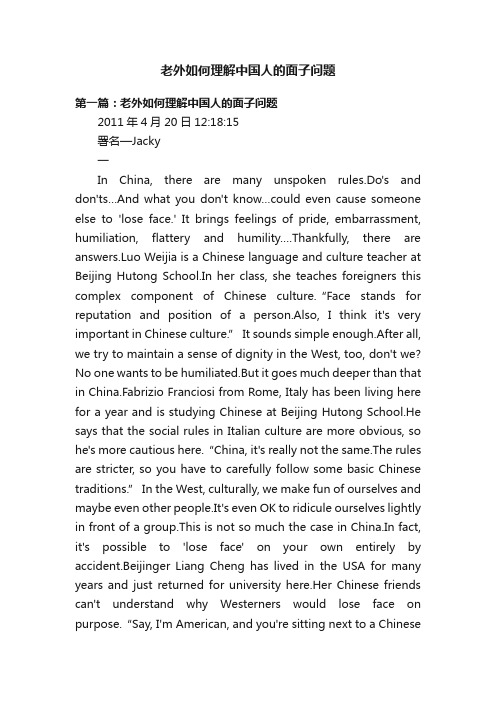
老外如何理解中国人的面子问题第一篇:老外如何理解中国人的面子问题2011年4月20日12:18:15署名—Jacky一In China, there are many unspoken rules.Do's and don'ts…And what you don't know…could even cause someone else to 'lose face.' It brings feelings of pride, embarrassment, humiliation, flattery and humility….Thankfully, there are answers.Luo Weijia is a Chinese language and culture teacher at Beijing Hutong School.In her class, she teaches foreigners this complex component o f Chinese culture.“Face stands for reputation and position of a person.Also, I think it's very important in Chinese culture.” It sounds simple enough.After all, we try to maintain a sense of dignity in the West, too, don't we? No one wants to be humiliated.But it goes much deeper than that in China.Fabrizio Franciosi from Rome, Italy has been living here for a year and is studying Chinese at Beijing Hutong School.He says that the social rules in Italian culture are more obvious, so he's more cautious here.“China, it's really not the same.The rules are stricter, so you have to carefully follow some basic Chinese traditions.” In the West, culturally, we make fun of ourselves and maybe even other people.It's even OK to ridicule ourselves lightly in front of a group.This is not so much the case in China.In fact, it's possible to 'lose face' on your own entirely by accident.Beijinger Liang Cheng has lived in the USA for many years and just returned for university here.Her Chinese friends can't understand why Westerners would lose face on purpose.“Say, I'm American, and you're sitting next to a Chinesefriend and then you hear something on the news for example about Americans doing something that, in your opinion, is really stupid.But to them, they don't know anything about the situation.And you say, 'Oh look at us, America is just going down the drain.' He would maybe look at you in a very strange way, you don't talk about this, and you don't talk about your own country in China.You don't joke like this.” Confrontin g people is also a delicate matter.Michael Cain from North Carolina arrived two years ago to study Chinese language and culture.Back then, his understanding was that “face” was somewhat related to ego.Through studying business practices in China, he's learned that good business has to respect these cultural norms.“I would say that being a Westerner, we are much more direct.And in China, directness can actually lead to a loss of face for the locals.If you're a foreign manager and you have2011年4月20日12:18:15署名—Jacky local workers, especially in front of someone else, especially being so direct, like, 'Why are you late? Why don't you do it in this manner?,' can cause a loss of face for a Chinese person, because it's like taking away their standing in front of their peers.” In the workplace, Luo Weijia explains that this is because what westerners consider group feedback could be viewed as public criticism in China.Likewise, people who want to save face may not like to admit mistakes.One of Luo's students is con stantly frustrated by this issue.“She's already been working here for three years and can normally get used to everything, so she can get along very well with her colleagues.But there is one problem she can't stand for.They can never admit they made a mistake, they pretend like nothing happened.So, that really annoys her.” Sometimes not understanding the rules may causeothers to lose face at dinners and outings.Unfortunately, as Cain points out, sometimes it's hard to know exactly how to behave.“I would say that I've had the experience of going out to dinner with a Chinese person, and they offer to pay, and you say, 'No, no,' but then they insist.And really, you're supposed to pay, but it kind of gets lost in who should be giving face to the other one.And I've caused those situations to happen, when I let them pay when I should have paid to give them face.And I've definitely taken someone to a place thinking it's the cool thing to do when it would have been better to take them to a Hong Kong restaurant that costs a load.” There are also rules in the classroom.By accident, foreigners questioning a teacher can cause him or her to lose face unintentionally.Luo teaches a small group of foreigners and adds that she is still learning to grasp this cultural differen ce.“In China, we really, really, respect Chinese teachers, like when I was in high school or university, we'd never tell my teacher, 'I don't trust you or I don't think you are right;I don't agree with you.' But sometimes, in my class, we maybe talk about some problem and they correct my opinion or correct my mistake.So, I feel a little bit humiliated in front of my class.But I think it's very normal for foreigners to say, 'You are wrong, I have a different opinion.' But for Chinese, it's a little bit weird, so it's better to be careful about that.” This doesn't mean you have to walk around scared to offend the Chinese people all the time.After all, Luo says that foreigners aren't expected to know these rules all the time.Thankfully, most Chinese people will be much more forgiving even if they are a bit confused by your actions.It's a different culture.So, many things get lost in translation.Or, in this case, lost in face.For CRI, I'm Andrea Hunt.2011年4月20日12:18:15署名—Jacky unspoken [,ʌn'spəukən]adj.无言的;未说出口的;不言而喻的 unspoken:未说出口的 | 欲言又止 | 不能说 do's [du:z]n.行为规范;(英)欢庆会;应该做的事(do的复数形式)Do's:什么; don'ts n.不该做的事Don'ts:不应该做的 | 不可做embarrassment [im'bærəsmənt] n.窘迫,难堪;使人为难的人或事物;拮据Embarrassment:尴尬 | 困窘 | 障碍humiliation [hju:,mili'eiʃən] n.丢脸,耻辱;蒙羞;谦卑humiliation:羞辱| 丢脸| 蒙耻humiliated v.屈辱(humiliate [hju:'milieit]的过去式);使丢脸,使蒙羞adj.羞辱的humiliated:感到受侮辱 | 乡村蓝调flattery ['flætəri] n.奉承;谄媚;恭维话Flattery:灌迷汤 | 谄媚 | 奉承 humility [hju:'miləti]n.谦卑,谦逊Humility:谦卑 | 谦逊 | 谦虚 component [kəm'pəunənt] n.成分;组件;[电子] 元件adj.组成的,构成的component:组件 | 成分 | 零件maintain [mein'tein] vt.维持;继续;维修;主张;供养maintain:保持 | 维修 | 维护保养供给stricteradj.strict的变形(strict [strikt])stricter:更加严密culturally ['kʌltʃərəli] adv.从文化角度,文化意义上;在人文学方面culturally:文化意义上ridicule ['ridikju:l] n.嘲笑;笑柄;愚弄vt.嘲笑;嘲弄;愚弄Ridicule:荒谎无稽 | 嘲笑 | 愚弄drain [drein] n.排水;下水道,排水管;消耗vt.喝光,耗尽;使流出;排掉水vi.排水;流干drain:排水 | 漏极 | 排水管confrontingv.面对;对抗(confront的ing形式);对立Confronting:对照delicate ['delikət]adj.微妙的;精美的,雅致的;柔和的;易碎的;纤弱的;清淡可口的delicate:精致的 | 精美的 | 细软的directness [di'rektnis, dai-]n.直接;率直;笔直directness:笔直 | 直接性feedback ['fi:dbæk]n.反馈;成果,资料;回复Feedback:意见反馈 | 反馈 | 回输 criticism ['kriti,sizəm] n.批评;考证;苛求criticism:评论 | 评鉴 | 批判主义 likewise ['laikwaiz]adv.同样地;也likewise:也 | 同样地 | 同样的 issue ['iʃju:, 'isju:] n.问题;流出;期号;发行物vt.发行,发布;发给;放出,排出vi.发行;流出;造成结果;传下kind of(副词性短语)有点儿;有几分;一种 | 稍微unintentionally [,ʌnin'tenʃənəli] adv.无意地;非故意地;非存心地第二篇:中国人面子问题探究中国人面子问题探究:人情可以实现权力再生产2014年05月21日10:11 中国青年报我有话说(1,178人参与)收藏本文翟学伟著作《中国人的脸面观:形式主义的心理动因与社会表征》封面江南贡院翟学伟在自己收藏的清代红木太师椅前。
中国人和美国人语言交际中的面子观探索(附英文版)

中国人和美国人语言交际中的面子观探索摘要:礼貌是人类交际中的普遍现象。
布朗和列文森在1978年提出的礼貌原则中的面子理论极具影响。
不同民族的人对面子的看法千差万别。
面子在顺利成功的社会交往中扮演着关键的角色,不考虑面子问题,人际交往将无法进行。
关键词:语言交际;礼貌;面子一、礼貌、面子和交际交际中的礼貌可以被定义为“一种用来显示意识到他人面子的手段。
”(Yule)在社会交往中找出一些不同的显示礼貌的原则是可能的。
其中包括得体、慷慨、谦虚和对他人的同情。
交际活动的参与者通常都会意识到这些准则和原则在社会生活中的大量存在。
打招呼、握手和寄送礼物,所有这些行为都展示了某种确定存在的好感和友谊。
人们表现得彬彬有礼是为了显示他们开始友好真诚的交际活动的愿望,或者是维持一种业已存在的与他人的和谐关系,或者当这种关系面临损害时去修补它。
要想维持一种和谐的人际关系和实现平稳有效的交际,礼貌是随时需要的重要手段。
但是,在一次交际活动中有时存在着一种更狭窄的但是作用更大的礼貌类型,要描述这种礼貌类型就要用到面子这一概念。
面子这一说法在1950年代末由戈夫曼提出。
他认为面子是每个人最神圣的东西,是所有交际者都必须予以关注的关键因素。
对面子的需求是相互的。
假如一个人要想得到面子,他就应该留意别人的面子。
这一点可以被《圣经》中的一条精练全面的原则所证明:要想别人怎样对待你,你就应该怎样对待别人。
因此面子是个体的一种社会意识。
个体在其中倾注了情感,也希望每一其他个体对此认可。
面子在交际活动中可能丢失、挽回、维护或者加强,必须随时给予关注。
通常,人们会有意无意地合作,在交际中展示他们对增强彼此面子的兴趣,因为大家都有各自想要实现的目的。
也只有每个人都接受和保护他人的面子,成功的交际活动也才可能顺利进行;也只有如此,社会才能相对平稳地发展,人际关系才得以拓宽,商业交易才能顺利进行。
交际活动可以被定义为一种包括发生在不同文本和情境之中的广义的概念。
中国面子文化英文作文
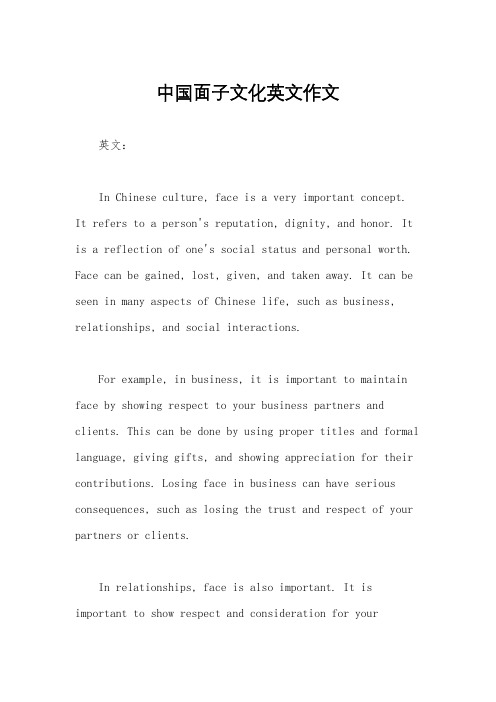
中国面子文化英文作文英文:In Chinese culture, face is a very important concept. It refers to a person's reputation, dignity, and honor. It is a reflection of one's social status and personal worth. Face can be gained, lost, given, and taken away. It can be seen in many aspects of Chinese life, such as business, relationships, and social interactions.For example, in business, it is important to maintain face by showing respect to your business partners and clients. This can be done by using proper titles and formal language, giving gifts, and showing appreciation for their contributions. Losing face in business can have serious consequences, such as losing the trust and respect of your partners or clients.In relationships, face is also important. It is important to show respect and consideration for yourpartner's feelings and opinions. Losing face in a relationship can lead to hurt feelings and damaged trust.In social interactions, face can be gained by showing generosity, kindness, and respect to others. It is important to maintain face by avoiding causing embarrassment or shame to others. Losing face in social situations can lead to humiliation and social ostracism.中文:在中国文化中,面子是一个非常重要的概念。
中西方跨文化交际中维护面子问题分析-西方文化论文-文体论文

中西方跨文化交际中维护面子问题分析-西方文化论文-文体论文——文章均为WORD文档,下载后可直接编辑使用亦可打印——随着全球化趋势的加快,跨文化交流正成为主流,比如面子问题在交际中容易演变为文化冲突。
本文以电影《面子》为切入点,分析女主人公小薇为维护“面子”作出的努力,从三个方面探讨了中西方面子观形成差异的原因,寻找维护双方面子的解决办法。
一、中西方文化对“面子”的理解“面子”最早被华裔人类学家胡先缙女士定义为“个人在社会上有所成就而拥有的声望,是社会对人看得见的成就得承认”在中国的定义中,“面子”不仅代表声望、权威、地位、金钱、荣誉、尊严,它的内涵比这些词语包含的范围还要广阔,它是“体面”与“情面”的总和。
其中“情面”作为中国文化所独有,指人际关系中的情分或情意,所以中国人的“面子”倾向于社会心理地位的认定,具有社会性、相互性和等级性特点。
而“面子”在西方通常有很多解释,但都指同一个含义:个人在他人面前和社会上的地位和尊严,即个人自尊心。
西方有人将“面子”分为两种,一种是“消极面子”,即个人行动自由不受他人阻碍,个人意愿不受别人干涉;另一种是“积极面子”,即个人意愿、行动和要求受他人影响并且得到满足。
西方文化中的认知更倾向于“消极面子”。
虽然西方人认为面子也有社会性,但与中国对“面子”的理解相比,西方更注重个利、行动的自由。
二、面子冲突的成因分析(一)文化价值观差异中西文化价值观最明显的差异是个人主义与集体主义的取向。
中国文化倾向于集体主义取向,中国人往往会以牺牲个人利益为代价,换取集体和国家的利益,表现在面子观上注重积极面子而弱化消极面子。
具体表现在人际交往中通过恭谦和自谦的手段给予对方脸面以达到交际的和谐。
而西方则倾向于个人主义取向,希望通过自己的努力得到社会的认可,完全不依赖于其家庭和人际关系,在面子观上的表现追求消极面子,弱化积极面子。
西方人讲究隐私,不喜欢把工作、婚姻等私人告知别人,也不随意干涉别人的生活。
中美面子观的差异及其对跨文化商务谈判的启示

中美面子观的差异及其对跨文化商务谈判的启示一、本文概述面子观,作为一种深深根植于社会文化和心理层面的现象,对人们的日常交往和互动行为产生着深远影响。
尤其在跨文化商务谈判中,面子观的差异往往成为导致误解和冲突的重要因素。
本文旨在探讨中美两国面子观的差异,并分析这些差异对跨文化商务谈判的影响和启示。
我们将首先定义并阐述中美两国各自的面子观内涵,然后对比两者的异同,最后讨论这些差异在商务谈判中的实际应用和应对策略。
我们将分别概述中国和美国的面子观。
中国面子观深受儒家文化影响,强调个人在社会中的地位、尊严和声誉,与个人品德、行为及他人的评价紧密相连。
而美国的面子观则更多基于个人主义和独立精神,重视个人权利和自由,面子往往与个人能力和成就相关。
我们将对比分析中美面子观的差异。
这些差异包括但不限于对面子概念的理解、面子的获取和维护方式、以及面子受损时的反应等方面。
理解这些差异对于避免跨文化商务谈判中的误解和冲突至关重要。
我们将探讨中美面子观差异对跨文化商务谈判的启示。
通过了解和尊重对方的面子观,谈判者可以更好地建立信任、理解对方的需求和期望,从而更有效地进行沟通和协商。
我们也将提出一些具体的策略和建议,帮助谈判者在跨文化商务谈判中更好地处理面子问题,以实现双赢的结果。
二、中美面子观的差异面子,这一在社会交往中极为重要的文化元素,在中美两国文化中具有截然不同的内涵和表现形式。
在中国文化中,面子往往与个人荣誉、社会地位及人际关系紧密相连,是一种无形的精神资产。
它不仅仅关乎个体的自尊,更涉及到家族、亲友乃至整个社区的荣誉。
因此,在日常交往中,中国人往往会采取各种策略来维护或增加自己的面子,比如通过送礼、请客、称赞他人等方式来展现自己的慷慨大方和社交能力。
在商务谈判中,这种面子观念同样表现得淋漓尽致,中国人往往更注重关系的建立和维护,希望通过长期的合作来增进彼此的了解和信任,从而确保合作的顺利进行。
相比之下,美国文化中的面子观念则相对淡化。
中国人的面子观英语作文
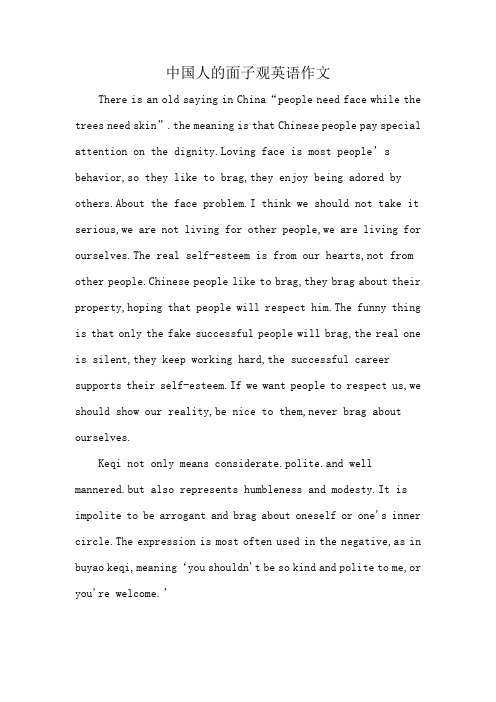
中国人的面子观英语作文There is an old saying in China“people need face while the trees need skin”.the meaning is that Chinese people pay special attention on the dignity.Loving face is most people’s behavior,so they like to brag,they enjoy being adored by others.About the face problem.I think we should not take it serious,we are not living for other people,we are living for ourselves.The real self-esteem is from our hearts,not from other people.Chinese people like to brag,they brag about their property,hoping that people will respect him.The funny thing is that only the fake successful people will brag,the real one is silent,they keep working hard,the successful career supports their self-esteem.If we want people to respect us,we should show our reality,be nice to them,never brag about ourselves.Keqi not only means considerate.polite.and well mannered.but also represents humbleness and modesty.It is impolite to be arrogant and brag about oneself or one's inner circle.The expression is most often used in the negative,as in buyao keqi,meaning‘you shouldn't be so kind and polite to me,or you're welcome.’Besides,Chinese seldom express what they think directly and they prefer a roundabout way.Neither show their emotions and feelings in public.They rarely greet people with a handshake.though it is very popular among foreigners,say nothing of embracing or kissing when greeting or saying good-bye.Consequently,it is better not to behave too carefree in public.even though you are well-intentioned.Also,it is advisable to be fairly cautious in political discussions.Do not particularly push yourself forward,or else you are unwelcome.。
英文论文中西面子观体现的文化差异_英语论文

---------------------------------------------------------------范文最新推荐------------------------------------------------------ 英文论文中西面子观体现的文化差异_英语论文AcknowledgmentsMy writing of this thesis has smoothly come to an end, and I hereby would like to extend my sincere gratitude to the following people for their selfless dedication and contribution to my thesis.5701My profound gratitude first goes to Associate Prof. Xu Jing, my supervisor, for her constant guidance and encouragement in the process of my writing. She offered me considerable and constructive advice, practical and profound suggestions on the completion of my paper. Just under her careful and patient guidance, I begin to get a clear idea of the paper and fully frame it out.Without her support and help, the completion of the present thesis is impossible.1 / 22I would like to express my heartfelt gratitude to the teachers who have ever taught me throughout my college years, especially Cao Xia, my British and American Culture course teacher. Her profound knowledge of western cultures led me into the world of culture, and also inspired me to make efforts in English learning. I am also very grateful to all other teachers of the School of Foreign Languages who gave me direct or indirect help during my study in the college.I am also grateful to my classmates and roommates for their encouragement, support, comments and wise advice.Last, I wish to devote this paper to my parents for their everlasting dedication that they have shown since I was just---------------------------------------------------------------范文最新推荐------------------------------------------------------ a little child.AbstractWith the progress of globalization and the development of science & technology, there are more and more intercultural interactions during daily life. However, due to the differences of cultures and customs, people from different countries often suffer from culture shock or collision, which does harm to communication. Politeness is required in all kinds of languages while face theory, as an important part of politeness, has great influence on the communication in daily life.China and Western Countries have different views on face due to their different modes of thinking and value systems. In the western countries, Brown and Levinson3 / 22proposed politeness principle centering on face, including face, face-threatening acts and face saving acts. In China, face is a conception which includes personal identity and social value. In this paper, I will make a comparison of face attitudes between China and Western Countries, then illustrate different behaviors caused by different face values, and offer some suggestions on how to avoid the collision on face, which will be helpful to avoid conflicts during cross-cultural communication.本篇论文共分为六部分。
面子在社会文化中的体现:中西方国家之间语言方面的比较研究
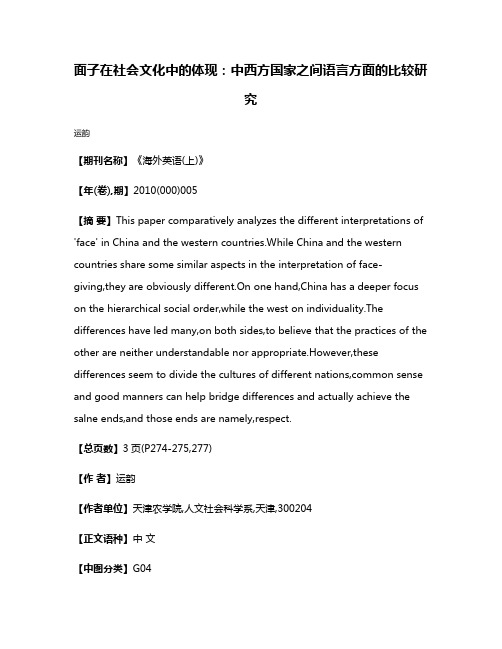
面子在社会文化中的体现:中西方国家之间语言方面的比较研究运韵【期刊名称】《海外英语(上)》【年(卷),期】2010(000)005【摘要】This paper comparatively analyzes the different interpretations of 'face' in China and the western countries.While China and the western countries share some similar aspects in the interpretation of face-giving,they are obviously different.On one hand,China has a deeper focus on the hierarchical social order,while the west on individuality.The differences have led many,on both sides,to believe that the practices of the other are neither understandable nor appropriate.However,these differences seem to divide the cultures of different nations,common sense and good manners can help bridge differences and actually achieve the salne ends,and those ends are namely,respect.【总页数】3页(P274-275,277)【作者】运韵【作者单位】天津农学院,人文社会科学系,天津,300204【正文语种】中文【中图分类】G04【相关文献】1.从面子礼貌体系角度探析中西方面子观的差异 [J], 李秋2.面子在社会文化中的体现:中西方国家之间语言方面的比较研究 [J], 运韵3.论跨文化交际中的中西方面子文化差异 [J], 范婉琳4.中西方面子观差异——以电影《喜宴》为例 [J], 刘虞婷5.基于不礼貌视角对比中西方面子观念的差异 [J], 曲轩仪因版权原因,仅展示原文概要,查看原文内容请购买。
- 1、下载文档前请自行甄别文档内容的完整性,平台不提供额外的编辑、内容补充、找答案等附加服务。
- 2、"仅部分预览"的文档,不可在线预览部分如存在完整性等问题,可反馈申请退款(可完整预览的文档不适用该条件!)。
- 3、如文档侵犯您的权益,请联系客服反馈,我们会尽快为您处理(人工客服工作时间:9:00-18:30)。
中国人和美国人语言交际中的面子观探索摘要:礼貌是人类交际中的普遍现象。
布朗和列文森在1978年提出的礼貌原则中的面子理论极具影响。
不同民族的人对面子的看法千差万别。
面子在顺利成功的社会交往中扮演着关键的角色,不考虑面子问题,人际交往将无法进行。
关键词:语言交际;礼貌;面子一、礼貌、面子和交际交际中的礼貌可以被定义为“一种用来显示意识到他人面子的手段。
”(Yule)在社会交往中找出一些不同的显示礼貌的原则是可能的。
其中包括得体、慷慨、谦虚和对他人的同情。
交际活动的参与者通常都会意识到这些准则和原则在社会生活中的大量存在。
打招呼、握手和寄送礼物,所有这些行为都展示了某种确定存在的好感和友谊。
人们表现得彬彬有礼是为了显示他们开始友好真诚的交际活动的愿望,或者是维持一种业已存在的与他人的和谐关系,或者当这种关系面临损害时去修补它。
要想维持一种和谐的人际关系和实现平稳有效的交际,礼貌是随时需要的重要手段。
但是,在一次交际活动中有时存在着一种更狭窄的但是作用更大的礼貌类型,要描述这种礼貌类型就要用到面子这一概念。
面子这一说法在1950年代末由戈夫曼提出。
他认为面子是每个人最神圣的东西,是所有交际者都必须予以关注的关键因素。
对面子的需求是相互的。
假如一个人要想得到面子,他就应该留意别人的面子。
这一点可以被《圣经》中的一条精练全面的原则所证明:要想别人怎样对待你,你就应该怎样对待别人。
因此面子是个体的一种社会意识。
个体在其中倾注了情感,也希望每一其他个体对此认可。
面子在交际活动中可能丢失、挽回、维护或者加强,必须随时给予关注。
通常,人们会有意无意地合作,在交际中展示他们对增强彼此面子的兴趣,因为大家都有各自想要实现的目的。
也只有每个人都接受和保护他人的面子,成功的交际活动也才可能顺利进行;也只有如此,社会才能相对平稳地发展,人际关系才得以拓宽,商业交易才能顺利进行。
交际活动可以被定义为一种包括发生在不同文本和情境之中的广义的概念。
是一种至少发生在两个交际者当中的信息传递过程。
语言作为主要的交际渠道或者工具,将语言信息从出发点/发出者传输到目的地/接收者。
信息发出者希望该信息或者语言会对听者产生某种效果。
然而,交际不仅是一种信息交换,也不只是一种交际双方都要积极组织信息建构的合作,它包括所有这些人们相互影响的过程。
所有行为都可以说是交际性质的。
用餐时的讨论、电话交谈和路上招呼提供的信息很少,但对于维持和谐的人际关系却是一种极其重要的手段。
一般而言,要知道什么是被推崇的,而什么不是;我们在何时何地应如何表现得适度和礼貌,以此来维护自己和他人的面子。
二、中国人的面子交际观几千年来。
面子在中国文化中一直扮演着非常重要的角色。
可以毫不夸张地说,不给对方面子,交际活动就难以顺利有效地进行。
中国人在交际中都有意识地关注面子问题。
正如一句广为人知的中国俗语说的那样:“人要脸树要皮。
”一个失了脸面的中国人将会对他参与的交际活动失去兴趣。
而导致某人丢面子也很可能危及此人在等级制度中的固有地位。
失面子不仅仅是一个让个人难堪的问题,还可能会影响一个集团的凝聚力或者整体面子,因此它也有着潜在的扰乱社会秩序的危险。
中国人之所以如此重视面子问题有两大原因:一是中国人千百年来一直在自己栖息的土地上耕耘生存,和周围的朋友、邻居和亲戚共同生活,很少有机会迁移。
当一个人和特定群体的生活息息相关时,保持成员间的和谐关系就尤为重要。
所以,保持融洽和谐的关系、避免冲突和保护每一个体和集体的面子就成为大家自然而且必要的选择。
其次,孔子强调大部分人类关系的实质是不平等的。
他不认为这种不平等有何不妥,因为上下尊卑长幼之间存在着不同的义务。
他认为只有当某种社会场景中的各方都克己守礼时,社会和谐才可能实现。
而实现此目标的方式之一就是接受和尊重每一个个体对保护自己面子的需求。
职位高的一方通常是行使权力的,但也应使自己具备道德上的同情心和正义感。
同样,下级则被要求尊重和服从上级的同时也期望着上级对自己的保护、关照和指导。
当某种难以处理的、不愉快的事情出现时,面子问题就更需要考虑。
与中国人交流时当然要小心面子问题,但老是担心谈话太随意会冒犯对方面子则大可不必。
为了更好地和中国人交往,胡文仲和格罗夫提出了以下八条原则:一是对那些在年龄和职务上高于自己的人恭敬谦让。
二是善待那些在年龄和职务上低于自己的人。
三是不要指望中国人会以违背集体原则的方式行事。
四是不要坚持认为你的上级尊重你自己的权利和观点。
五是不要以任何方式挑战上级认可的道德规范。
六是不要显示愤怒,要避免对抗。
七是如果你必须说“不”,尽可能说的委婉迂回。
八是如果必须提出批评和指责,最好私下进行,同时对对方的说法予以肯定。
尽管中国人并不是在每种情形中都考虑面子问题,但采取上述策略还是安全和有益的。
现代中国一直受到外国文化的影响,中国人在物质生活和思想模式方面都经历着巨大的改变,许多中国人正在调整和形成新的面子观。
但是,如果因此就认为中国人不再关注面子问题就大错特错了。
如果你在和中国人交往中使对方失了面子,你该如何应对?如果你发现一个中国朋友或者同事对你的态度和行为有着明显的负面变化,或者你发现要从一个你曾经信赖的中国朋友那里得到帮助信息变得更难了,那你就得认真对待这种情况了。
原因可能是你使对方失了面子,以下做法将有助于挽回面子:首先,停止任何可能继续导致丢面子的行为;其次,找一个和大家关系都好的熟人,请他在你们之间调解;再次,不管你是否做第二步,你都应该向被你冒犯的人道歉并请求谅解;最后,以后要尊重和体谅对方,要在各方面都考虑到对方的地位、需求和内心隐秘的愿望。
总之,要想方设法恢复曾被你伤害过的对方的面子。
三、美国人在交际中的面子问题不同民族的人对面子的看法千差万别。
美国人很少谈及面子,有人因此认为美国人不关心面子。
然而事实并非如此。
研究面子问题的社会学者和语言学家已经证明了面子问题是人类交际活动中共同关注的问题,所以美国人也绝不例外。
我们需要注意的是交际中中国人和美国人对面子概念在认识上的差别。
在第三部分中我们已经谈到中国人的面子问题存在于大多数人的意识之中。
而美国人可能将其看作一种和个人隐私、自由、自立、人权、独立、财富以及声誉等等相关的东西。
这些东西并不等同于面子,但美国人对它们非常看重。
美国人除了本土印地安人外,都是来自世界各地尤其是欧洲的移民或者移民后裔。
他们的生活自殖民时期以来一直处于流动之中。
如果他们厌倦了一个地方,或者发现在该地生活不再感到舒适,那他们会毫不犹豫地迁往他乡以追求更好的生活,这样他们人生中的朋友、邻居、同事和熟人都会不停地变换。
正因为这种集体成员的不断变动,美国人更关注个体而不是集体。
对他们而言,保持和保护集体的凝聚力和和谐关系自然就不如中国人认为的那么重要了。
在美国这样一个相对中央集权制度较低和对维持特定等级制度相对忽略的国家,失面子会导致个体难堪而不一定会威胁到集团的团结,或者导致社会生活结构的解体。
尽管美国也有等级制度,但人们总是试图缩短这种社会差距来显示人生平等这一信条。
他们也尽可能地模糊权力和地位间的差异,认为所有人本质上都是一样的。
另外,整个社会的高度流动性始终是美国社会生活的一大特点,而大多数人也都认为这是件好事。
在大多数普通的社会交往中,美国人喜欢直截了当。
他们欣赏开门见山和直抒胸臆。
当他们不懂时,他们就说:“我不知道”;当他们没有被赋予某种权利时,他们就说:“我不能那样做”。
他们当然知道,这种直接真实的回答在情感上会令他人不快,但是他们还是会实话实说。
他们认为只有把目前情况用最直接明白的语言阐释清楚,大家才能更好地维护自己的权益。
他们不是不重视礼貌和他人的感受,恰恰相反,他们非常在意。
每当别人的感受和面子会遭受风险时,他们都会尽可能地察觉。
只不过他们高度认可直截了当,所以在敏感情形中,他们的职责是用一种直接而且尽可能委婉的方式提供完整的信息。
四、结语任何人际交往都会面临风险,这对交际双方的面子也是如此。
对交际双方而言,面子问题必须谨慎处理。
面子作为身份的一个重要方面,已被视为所有交际活动中的一个至关重要的组成部分。
语言学家们对此进行了大量的研究,想了解交际参与者如何决定自己的相对地位,他们要使用什么语言来说明这种地位差别,同时考虑到参与者的面子问题。
既然面子概念在不同人际交往形式中不同程度地存在,参与者必须在开始交际前就做到心中有数。
简言之,可以不考虑面子的交际活动是不存在的。
参考文献:[1]Brown,P. & S. Levinson, Politeness: Some Universals in Language Usage. C a mbridge: CUP, 1987,(61).[2]He, Zhaoxiong, Study of politeness in Chinese and English Cultures[J].外国语, 1995,(05).[3]Hu, Wengzhong & C. L. Grove, Encountering the Chinese: A Guide for Americ a ns. Yarmouth, ME: Intercultural press, 1991.[4]Hudson, R. A, Sociolinguistics[M]. Beijing: Foreign Language Teaching a n d Research Press, 2000.[5]Scollon, R. & S. W. Scollon, Intercultural Communication: A Discourse App roa ch. Beijing: Foreign Language Teaching and Research Press, 2000.[6]Wardhaugh, R. An Introduction to Sociolinguistics. Beijing: Foreign Langu age T eaching and Research Press, 2000.[7]Yule, G., Pragmatics[M]. Shanghai: Shanghai Foreign Language and Educ at ion Press, 2000.[8]何兆熊. 语用学概要[M ]. 上海: 上海外语教育出版社, 1987.[9]何自然. 语用学与英语学习[M ]. 上海:上海教育出版社, 1996.[10]陈融. 面子•留面子•丢面子[J].外国语, 1986,(04).[11]陈治安等. 英汉对比语用学与英语教学[M]. 北京:外语教学与研究出版社, 2 002.[12]周榕,胡永红.Politeness Strategies in English and Chinese [M]. 北京:外语教学与研究出版社, 2002.[13]祝畹.社会语言学概论[M]. 长沙:湖南教育出版社, 1994.Chinese and American Language Communication in the face view of explorationAbstract: The politeness is a common phenomenon in human communication. Brown and Levinson's politeness in 1978 proposed the principle of high-impact theo ry in the face. Of different nationalities of people's views vary widely on the face. Face in the smooth and successful social interaction plays a key role, regardless o f losing face, interpersonal communication would be impossible.Keywords: language communication; politeness; faceFirst, politeness, face and communicationCommunication politeness can be defined as' a kind of used to display the m eans to realize that other people face. '(Yule) in social interaction to identify a num ber of different principles of courtesy which is possible. Including tact, generosity, h umility and compassion for others. Communicative activities of the participants are usually aware of these norms and principles in social life abound. Hello, shaking h ands and send gifts, all of which show some kind of established the existence of g oodwill and friendship. People behave politely to show that they began to communi cative activities, friendship and sincere desire to, or already exists to maintain a ha rmonious relationship with others, or when such relations are facing an injury to fix it. To maintain a harmonious interpersonal relationships and achieving a smooth a nd effective communication, courtesy is an important tool at all times. However, in a communicative activities, there is sometimes a more narrow type of courtesy, but is even more necessary to describe this type of courtesy is necessary to use the concept of face.Face of this argument in the late 1950s made by Goffman. He believes that everyone face the most sacred thing is that all communication must be of concern to those who are a key factor. On the face of the demand is mutual. If a person i s to obtain a face, he should pay attention to someone else's face. This can be 't he Bible' in a concise and comprehensive proof of principle: If we want other peopl e to treat you, how you should treat others. Therefore, individuals face is a kind of social consciousness. In which individuals have devoted feelings, I hope every oth er individual on this recognition. Face may be lost in the communicative activities t o restore, maintain or strengthen, we must keep attention. Usually, people will cons ciously or unconsciously cooperate in communication to demonstrate their interest in enhancing each other's face, because everyone of us want to achieve their own purposes. Only individuals are taking and the protection of other people's face, until the success of communication activities may be carried out smoothly; only this, so ciety can be relatively stable development, interpersonal skills, was able to expand, business transactions can be carried out smoothly. Communicative activities can b e defined as a place, including among the different texts and contexts of the broad concept. Is a place for at least two communication of information among those wh o transfer process. Language as the main communication channel, or tools, the lan guage information from the starting point / sender transmitted to the destination / r ecipient. Information issued by the hope that the information or language would have an effect on the listener. However, the communication is not only an exchange of information, not just a kind of communication that both sides should actively orga nize and construct information on the cooperation, which includes all of these peopl e are interactive process. All behavior can be described as communicative in natur e. Meals discussions, telephone conversations and provided little information on the road greeting, but for the maintenance of harmonious interpersonal relationships is an extremely important tool. Generally speaking, we must know what is being res pected, and what is not; when and where we are on how to behave appropriately and courtesy as a way to safeguard themselves and others face.Second, the Chinese concept of face communicationFor thousands of years. Face in Chinese culture have always played a very i mportant role. It is no exaggeration to say that, not to each other face communicat ion activities would be difficult to smooth and efficient manner. Chinese people hav e a sense of attention to communication in the face. As a well-known as the Chin ese saying goes: 'people have to face the tree to be leather. 'A lost face, the Chin ese people will be involved in the communicative activities of his losing interest. W hich result in a person losing face is also very likely to endanger the person in the hierarchy inherent in the status. Loss of face is not just an embarrassing problem for individuals, but also may affect the cohesion of a group or a whole face, it als o has the potential to disrupt social order risk.The reason why the Chinese people attach importance to face the problem t here are two main reasons: First, the Chinese people in their own habitat for thous ands of years have been hard to survive on land, and the surrounding friends, nei ghbors and relatives to live together, rarely have the opportunity to migrate. When a particular group's daily lives and when to maintain a harmonious relationship amo ng members is particularly important. Therefore, to maintain harmonious relations, to avoid conflict and protect each individual and collectively we face has become a natural and necessary choice. Second, Confucius stressed that most of the human nature of the relationship is unequal. He did not think that what is wrong with this inequality, because the bottom of hierarchy exists between the different inter-genera tional obligations. He believes that only when some kind of social scene Katsumi S hurei all parties, social harmony can be realized. But one of the ways to achieve t his goal is to accept and respect the right of every individual to protect their face needs. The party in high positions are often the exercise of power, but should also equip itself with the moral compassion and sense of justice. Similarly, the lower w ere required to respect and obey their superiors and also look forward to higher au thorities for their protection, care and guidance.When a difficult to deal with unpleasant things arise, face the problem even more to consider. Exchanges with the Chinese of course have to be careful when you face problems, but too casual conversation would always worry about offending each other's face is totally unnecessary. In order to better and the Chinese peopl e contacts, Hu Wenzhong and Grove proposed the following eight principles:First, for those in age and position higher than themselves respectful humility. The second is to treat those in age and position lower than themselves. Third, do not expect the Chinese people will act in a manner contrary to the principle of col lective. Fourth, do not insist that you respect your superiors of their rights and vie ws. Fifth, the challenges do not in any way approved by higher moral standards. 6 is not to show anger, it is necessary to avoid confrontation. 7 is that if you have to say 'no', as the euphemism that roundabout. Eighth, if you have to criticize and blame, preferably in private, while the other's claim be affirmed.Although the Chinese people did not take into account in each case both face problems, but to take such strategies are still safe and beneficial. Modern China h as been the impact of foreign culture, the Chinese people in the material life and t hought patterns have undergone tremendous changes, many Chinese people are a djusting and the formation of a new concept of face. If, however, decided that it n o longer care about the Chinese people face the problem wrong.If you contact convinces the other side and the Chinese lost face, how do y ou respond? If you find a Chinese friend or colleague on your attitude and behavio r that has significant negative changes, or you find that you have from a trusted fri end of China, where information becomes more difficult to get help, and then you have to take seriously this case scenario. Reason may be that you bring the other side lost face, the following approach will help to save face: first, to stop anything that might continue to cause loss of face behavior; secondly, to find a relationship, and we have a good acquaintance, invited him to mediate between you; Again, regardless of whether you do the second step, you should be the person you offend ed an apology and a request for understanding; Finally, the future should respect a nd understanding each other, we must take into account all aspects of each other's status, needs and aspirations of inner secret . In short, we must find ways to rest ore once you've hurt each other's face.Third, the Americans face problems in communicationOf different nationalities of people's views vary widely on the face. Few Amer icans are talking about face, some argue that the Americans do not care about fac e. But the fact is not true. Face the problem of social studies scholars and linguist s have proved to save the face of human communicative activities of common con cern, so Americans are no exception. We need to note that the communication in t he Chinese and Americans face the concept of understanding the difference. In the third section, we have already talked about the Chinese people face the problem exists in most people's consciousness. The Americans may be viewed as a sort of personal privacy, freedom, independence, human rights, independence, wealth and reputation, and so related to things. These things is not the same face, but the A mericans they are very valued.In addition to native American Indians, they are all from around the world es pecially in Europe, immigrants or descendants of immigrants. Their lives since the colonial period has been in a flow into. If they are tired of a place, or found in the way of life no longer feel comfortable, then they will not hesitate to move to forei gn land in pursuit of a better life, so that they life friends, neighbors, colleagues and acquaintances will be non-stop to change. It is precisely because of this collective members of the ever-changing, Americans are more concerned about the individu al rather than collective. For them, to preserve and protect the collective cohesion and harmonious relations will naturally not as good as Chinese people think that's l ess important.In the U.S., with a relatively low and the maintenance of a centralized syste m for a particular hierarchy of the relative neglect of the country, loss of face woul d result in embarrassment for the individual and not necessarily a threat to group s olidarity, or lead to the disintegration of the structure of social life. Although the Un ited States also has caste system, but people always try to shorten the life of this social gap to show the equality of this doctrine. They also blur as much as possibl e the differences between power and status that all people are essentially the sam e. In addition, the high mobility of society as a whole has always been the United States a major feature of social life, and most people think that this is a good thin g.In most ordinary social interactions, Americans like straightforward. They appr eciate the straight to the point and direct express one's mind. When they do not k now, they say: 'I do not know'; when they have not been given certain rights, they say: 'I can not do that'. Of course they know the real answer to such a direct em otional will make other people unhappy, but they still tell the truth. They believed t hat only the current situation in a language understood by the most direct interpret ation of clear, we can better protect their interests. Either they do not attach import ance to good manners and the feelings of others, on the contrary, they are very c oncerned about. Whenever other people's feelings and reputation would be at risk, they will be aware of as much as possible. However, they highly recognized straig htforward, so in sensitive cases, their duty is to use a direct but tactful way possibl e to provide complete information.4 ConclusionAny person who will face the risk of interpersonal relationships, which both fa ce communication as well. The two sides of the communication, the face must be handled with care. Face as an important aspect of identity has been regarded as a ll the communication activities in a critical component of. Linguists have done a gre at deal of research, the participants would like to know how to determine their own communicative relative position, what language they use to illustrate the difference between this status, taking into account the participants face. Since the concept of face in different forms of interpersonal communication exist to varying degrees, pa rticipants must be aware of before starting communication. In short, they do not co nsider the face of the communication activities does not exist.。
